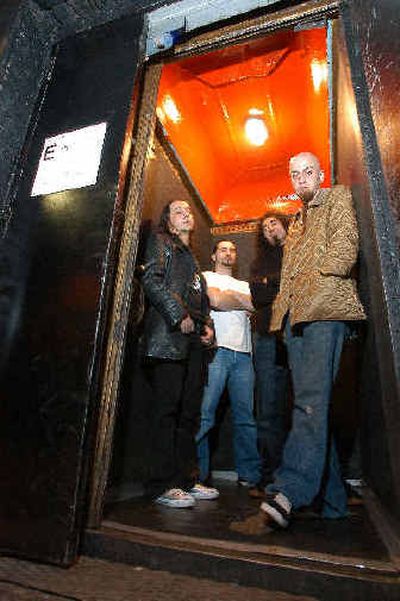Beyond politics

System of a Down wants you to know it is not a political band.
Yes, the band members came out against the war in Iraq.
And yes, they hand-picked ultraliberal gadfly Michael Moore to direct their 2003 protest video, “Boom!”
And yes, their latest single, the frenetic, guitar-crunching “B.Y.O.B.,” contains angry rants like: “Why don’t presidents fight the war? Why do they always send the poor?”
But still, Serj Tankian and Daron Malakian – one half of the eclectic metal quartet – fiercely resist when people try to define them as the band with the left-leaning agenda.
“The fact that journalists have so made us into a political band, it’s forcing us to be apolitical in some ways as a reaction to it,” says Tankian, who on this day is the antithesis of his wild-man stage persona – soft-spoken and drinking herbal tea to soothe a sore throat.
“Even though we have things that we touch upon, you know, social issues or political issues, it’s a small percentage of what we do, compared to personal narratives, songs about life, theories, sex, humor.”
Besides the politically charged first single – which Tankian won’t even admit is an anti-war song, despite the soldier-themed video – there’s plenty of material on the band’s new album, “Mezmerize,” to back up Tankian’s contention.
The CD, part of an outpouring of material that will continue in the form of a second album, “Hypnotize,” in the fall, is at times mournful, romantic, hysterical, and bizarre and may be the best synopsis of System of a Down in the band’s 10-year history.
“There was a time when they had to write songs very specifically to define who they were,” says longtime producer Rick Rubin, who worked with the band on its latest album.
“Now, we know who they are, so now they can write their best songs, and they don’t have to fit in such narrow guideline. It seems like people are more willing to go along the trip with them.”
Since the group’s self-titled debut CD in 1998, it has sold millions of albums with its amped-up metal sound anchored by bursts of melody and Tankian’s voice, which ranges from soaring to screeching.
The new album, like previous System of a Down efforts, is hard to classify or describe: Middle Eastern musical influences mix with almost operatic melodies and guitars thrashing at breakneck speed.
“It’s rare to hear such emotional vocal harmony going on over such heavy music,” Rubin says. “They’re kind of a throwback to the time when heavy music could be interesting – in the ‘60s and ‘70s.
“I think they’re a true metal band, but metal has changed and gone away from the days of Black Sabbath and become really cookie-cutter. Everyone is competing to be the hardest, but no one is really writing songs.”
Unlike some other metal bands, System of a Down’s lyrical content has always been as integral to the band as its musical component, dealing with serious subjects ranging from drug addiction to government domination.
Band members always have been vocal about their social causes or concerns, whether it be Tankian playing benefits to draw awareness to the Armenian holocaust of years ago (he and Malakian are of Armenian descent) to Malakian’s concerns about the war in Iraq (he has family there).
But there are elements of humor in their music, too, which certainly is evident on the new record. “Old School Hollywood,” which Malakian wrote after feeling a little left out at a celebrity softball game and features lines like: “Tony Danza cuts in line / Old school Hollywood, washed up Hollywood / Standing in the sun, I’m wasting my time / Old school Hollywood, washed up Hollywood.”
Says Tankian: “Even in our most serious songs there’s like absolutely hilarious antics going on and that comes from us just thinking, ‘Hey, we can’t take ourselves seriously – otherwise, we miss the point – and no one (else) should, either.’ “